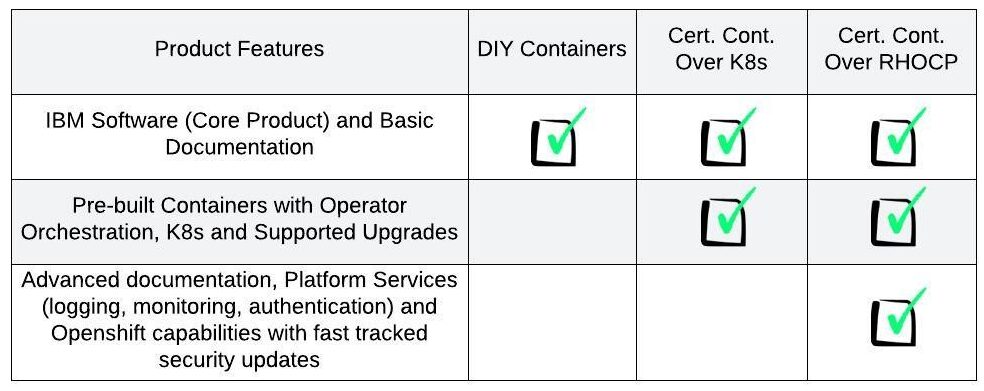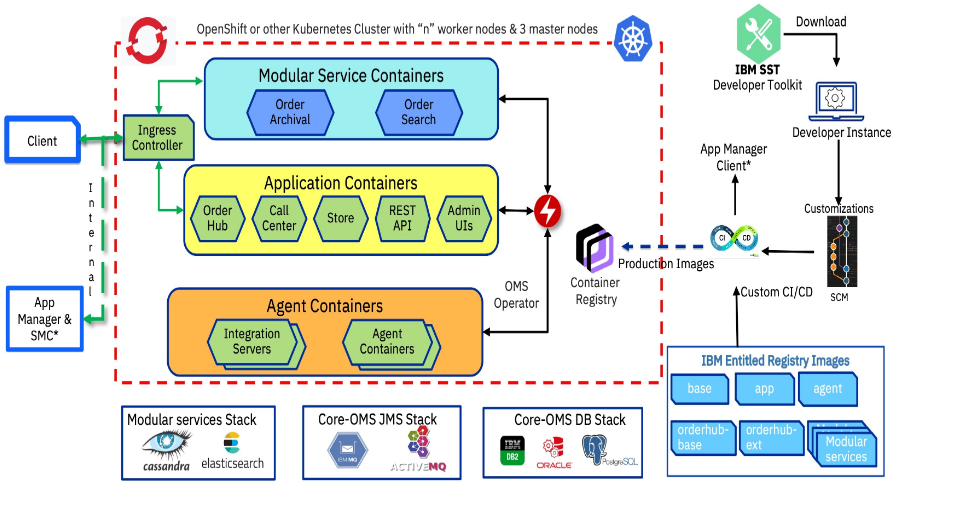Many retailers are embarking on a digital transformation to modernize and scale their order management system (OMS) solution. Built on a modern architecture, the solution wraps Docker containers around order management business services. This architecture streamlines application management and the release of new functionality. The container technology also supports varying levels of technical acumen, business continuity, security, and compliance. If you want to reduce capital and operational expenditures, speed time to market, and improve scalability, elasticity, security, and compliance, you should consider moving your on-premises IBM Sterling application to IBM supported native SaaS or other cloud solutions which best suits your business.
Tailored Hybrid Cloud Solutions from IBM
IBM offers retailers three distinct hybrid cloud solutions tailored to their specific needs. The first option involves a do-it-yourself (DIY) approach with containers on any platform. While offering flexibility, it comes with potential downsides such as slower time to market, increased operational costs, and higher risk due to the intricacies of self-managing containerized environments. The second option introduces a more robust solution with IBM Certified Containers deployed using Kubernetes, striking a balance between customization and manageability. Option three, the most advanced choice, employs IBM Certified Containers deployed through the Red Hat OpenShift Containers Platform. This enterprise-grade solution prioritizes faster time to market, reduced operational costs, and lower risk, providing a secure and comprehensive hybrid cloud environment for organizations seeking efficiency and reliability in their IT transformation endeavors.
 *K8s is referred to Kubernetes. * RHOCP is referred to Red Hat OpenShift Container Platform.
*K8s is referred to Kubernetes. * RHOCP is referred to Red Hat OpenShift Container Platform.
IBM Sterling Certified Container Overview
IBM Sterling Order Management certified containers are distributed in the form of three images—om-base, om-app, and om-agent—via the IBM Entitled Registry. This distribution utilizes licensed API keys, streamlining the process for customers to conveniently retrieve and access these containers in their local registries or incorporate them seamlessly into their CI/CD pipelines.
- om-base: Serving as the foundational image, om-base is provisioned on the IBM Cloud Container Registry (Image Registry). It is equipped for the addition of product extensions and customizations, allowing customers to create a customized runtime tailored to their specific needs.
- om-app: This image is the Order Management application server designed to manage synchronous traffic patterns. It incorporates the IBM WebSphere Liberty application server. The different om-app images that are built using the customized runtime can be deployed with a dedicated route or ingress to expose the applications in om-app images. Routes are created only if using a Red Hat OpenShift Container Platform cluster. For any other Kubernetes cluster, ingress is created.
- om-agent: This container serves as the Order Management workflow agent and integration server, specifically tailored to handle asynchronous traffic patterns.
Basic Architecture of Sterling OMS – Post Deployment on K8s or RHOCP
 Image Courtesy: IBM
Image Courtesy: IBM
Key Benefits of IBM Sterling Certified Containers
- Flexibility: Multi cloud & platform validated to run applications anywhere seamlessly.
- Speed: Faster start-up times and new instance creation with easy install and configurations.
- Efficient Scaling and Deployment Management: Auto-scaling with standardized deployment across all environments. Optimize your infrastructure by capacity scaling & reduced compute resources. Better logging and monitoring and support for continuous integration & delivery.
- Security: Safeguard brand reputation with top-tier security standards.
- Seamless Upgrades with Zero Downtime: Simplify application deployment and maintenance with zero down-time upgrades.
Cloud Solutions for IBM Sterling Order Management
IBM offers its native Software as a Service (SaaS), commonly known as IBM Cloud or CoC, taking on the responsibility for hosting, managing, maintaining, and monitoring the entire Order Management (OM) ecosystem. This allows customers to direct their focus toward achieving their business requirements and enhancing business services. IBM’s ownership and management of the DevOps process facilitate automatic upgrades of the OMS application with new features, alongside activities such as backup, database reorganization, and upgrades/patches for WebSphere Application Server (WAS) Liberty, MQ, DB2, and Red Hat Enterprise Linux (RHEL). The proactive monitoring of system performance, coupled with the establishment of automatic alerts and remediation procedures for instances of high CPU/memory usage, ensures a seamless experience for customers. Convenient access to detailed audits/graphs of system performance is provided through a self-serve tool, complemented by log monitoring via Greylog.
In contrast, three other well-regarded cloud solutions compatible with IBM Sterling Certified containers—Amazon AWS, Microsoft Azure, and Oracle Cloud Infrastructure (OCI)—present unique advantages. However, customers opting for these alternatives bear the responsibility of implementing measures to manage, maintain, and monitor the entire Order Management (OM) ecosystem. This encompasses tasks such as database backups, infrastructure upgrades, and system performance monitoring. Additionally, customers must seamlessly integrate with logging tools of their choice when opting for these alternatives.
Conclusion: A Path to Modernization and Efficiency
In conclusion, the shift towards a modernized and scalable Order Management System (OMS) is becoming imperative for retailers undergoing digital transformation. The adoption of IBM Sterling Certified Containers and Software as a Service (SaaS) solutions presents a strategic pathway to enhance flexibility, speed, efficiency, and security in managing the OMS ecosystem. IBM’s hybrid cloud offerings provide retailers with tailored choices, allowing them to align their preferences with the desired level of customization, manageability, and risk. The option to leverage IBM’s native SaaS or explore alternate cloud solutions like Amazon AWS, Microsoft Azure or Oracle Cloud underscores the adaptability of IBM Sterling solutions to diverse business needs. As retailers navigate the complexities of modernizing their OMS, the comprehensive support provided by IBM’s SaaS offerings stands out, ensuring a secure, efficient, and future-ready infrastructure for their digital endeavors.
Key Links-
Deploy Sterling Order Management on Azure Red Hat OpenShift – IBM Developer
Deploy IBM Sterling Order Management Software in a Virtual Machine on Oracle Cloud Infrastructure



